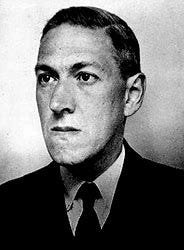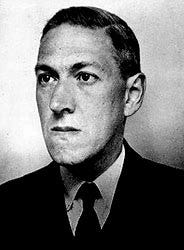H.P. Lovecraft and the Living Land
An examination of the "The Street" and the Problem of Modern America
“There be those who say that things and places have souls, and there be those who say they have not; I dare not say, myself, but I will tell of the Street.”~ H.P Lovecraft, “The Street”
Introduction
To most of those who read this, I am sure H.P. Lovecraft requires no introduction. But for those who are unfamiliar with the legend: Howard Phillips Lovecraft was born in Providence, Rhode Island in the year of our Lord, 1890. He passed in 1937. He is unfortunately not as widely read as he ought to be; he gets slandered as a “racist”, “fascist”, “white supremacist”, and I’m sure some other buzzwords could be rightly attributed to him as well. In other words; as far as contemporary American Writers and thinkers go; he’s our guy. His cosmic horror is fascinating to read, which is what he is most well-known for; but the point of this article is one short story he wrote in 1919 called “The Street”. Lovecraft exemplified in this story what so many Tradionalists before him and after him have understood; as well as mainstream authors such as Tolkien taught us in his epic trilogy. Without further ado.
“The Street”
This short story is one of a small New England town, the main character is “The Street” and the Anglo-Saxons who built it were her inhabitants:
“Men of strength and honour fashioned that Street; good, valiant men of our blood who had come from the Blessed Isles across the sea… and in a few years more, men built cabins on the south side of the Street.”
~H.P. Lovecraft, “The Street”
The men who built the street raised families on the homes that lined her, their children played on her cobblestone, and the men eventually walked to war across the old Street:
“So the Street dreamed on, past wars, calamities, and changes. Once most of the young men went away, and some never came back. That was when they furled the Old Flag and put up a new Banner of Stripes and Stars. But though men talked of great changes, The Street felt them not; for its folk were still the same, speaking the same old familiar things in the same old familiar accents…”
~“The Street”
The United States of America, as I have written about before, was built by and for a people, and for their posterity. Our fathers who came here only fought to separate from the crown only as a last resort.
“In every stage of these Oppressions We have Petitioned for Redress in the most humble terms. Our repeated Petitions have been answered only by repeated injury…”
~“The Declaration of Independence”
While they had a unique identity, that identity was not one which could ever be abstracted from their history:
“Providence has been pleased to give this one connected country to one united people.
A people descended from the same ancestors, speaking the same language, professing the same religion, attached to the same principles of government, very similar in their manners and customs.
This country and these people seem to have been made for each other.”
~John Jay, First Chief Justice of the United States
God granting land to a People is not an idea which is foreign to Christians; God gave Israel the land of Canaan, our Western Forefathers considered God to have given them their land; our American Forefathers simply continued in their footsteps. Manifest Destiny exemplifies the Western understanding of Divine Providence giving land to a people. The land becomes tied to a people, given them by God and baptized in their blood. Alexander Dugin in “The Rise of the Fourth Political Theory” tells the story of the “Serbian Mountain”, I will quote it in its entirety:
“In 1992 in Serbia I once met a brigade of Serbs, whom everyone had betrayed until that time. When we stopped, we asked them:
—Where are you going and why?
—We’re going to take this mountain.
—What do you need the mountain for? There’s nothing there, or is it a strategically important point?
— No no, strategically it is not at all important, there’s absolutely nothing there, neither water, nor electricity. But this is our Serbian Mountain. ‘This mountain does not want to belong to Croatia; this mountain wants to stay in Serbia. It calls us.’ Yes, there are numerous Croatian brigades there, and Bosnian-Muslims on the right. And we will go right now, and we will die there.
Why were they travelling there? One might think that they are dummies, completely ridiculous people. What, don’t they understand that it is good to live, that they can eat, sleep, stroll, read, and swat flies? But they invest their life in a mountain, because the mountain called them. It said to them: ‘Men, come here, come. I need your deaths. The mountain spoke to them, and they understood that it calls them. And this is not madness. It is right.
Nobody needed the mountain, but the mountain was Serbian… They say: ‘This mountain is a part of our collective, this is our friend; they insult her, and we come to rescue her.”
~Alexander Dugin, “The Serbian Mountain”
The Mountain for the Serbians that Dugin recalls, is what The Street is for Lovecraft. The Street has a people that it loves, that it longs for, that it will only be satisfied to accept. Those who are not her people are rejected, she decays; she cries as her people are forced out. She does not lament merely when a new flag is flown over her, only when her children have been replaced by those which are not her own:
“Then came the days of evil, when many who had known The Street of old knew it no more; and many knew it, who had not known it before. And those who came were never as those who went away; for their accents were coarse and strident, and the mien faces unpleasing. Their thoughts, too, fought with the wise, just spirit of The Street…”
~“The Street”
The story, as is common with Lovecraft —much to Bilbo’s dismay— ends in terror:
“…and after the crash there was nothing left standing in the Street save two ancient chimneys and part of a stout brick wall. Nor did anything that had been alive come alive from the ruins…”
~“The Street”
It should not be surprising to those familiar with Lovecraft that “The Street” is criticized for the anti-immigration and pro-white stance. I will do my best to not burden you with telling the obvious meaning of the story. Rather, I want to propose that Lovecraft does in fact believe that the land has a soul, it feels, it remembers, it yearns for salvation. This is not a concept foreign to Christianity:
“For the earnest expectation of the creation eagerly waits for the revealing of the sons of God. For the creation was subjected to futility, not willingly, but because of Him who subjected it in hope; because the creation itself will also be delivered from the bondage of corruption into the glorious liberty of the children of God. For we know that the whole creation groans and labors with birth pangs together until now.”
~Romans 8:19-22
Tolkein understands this idea, the whole of creation is living; the Legolas can hear its sounds, Treebeard walks and talks, the rivers are guided by spirits; land is not simply something that any people can use or abuse to their benefit. There are living borders, and when those living borders are upset, the land cries. Our streets accepted us, God gave them to us, and they blessed us abundantly; they were built by golden men and love the golden feet which once strode upon them. Origen Adamantius1 posted this quote from Lovecraft today which rekindled my interest in writing this article:
“Most dangerous and fallacious of the several misconceptions of Americanism is that of the so-called melting pot of races and traditions. It is true that this country has received a vast influx of non-English immigrants who came hither to enjoy without hardship the liberties which our British ancestors carved out in toil and bloodshed. It is also true that such of them as belong to the Teutonic and Celtic races are capable of assimilation to our English types and of becoming valuable acquisitions to the population. But from this it does not follow that a mixture of really alien blood or ideas has accomplished anything but harm. Observation of Europe shews us the relative status and capability of the several races, and we see that the melting together of English gold and alien brass is not very likely to produce any alloy superior or even equal to the original gold.”
~H.P. Lovecraft
Our streets have rejected those who are not her own, she abhors the immigrants which destroy her:
“With the years worse fortune came to The Street. Its trees were all gone now, and its rose-gardens were displaced by the backs of cheap, ugly new buildings on the parallel streets.”
~“The Street”
Our streets are under siege, our gold at risk of being changed into something inferior. We are at great risk of becoming a people unrecognizable to our streets… who perhaps still recognize the last of a dying people who faithfully walk the roads of our ancestors:
“…the people were urged to tear down the laws and virtues that our fathers had exalted; to stamp out the soul of the old America —the soul that was bequeathed through a thousand and a half years of Anglo-Saxon freedom, justice, and moderation… that at their word of command many millions of brainless, besotted beasts would stretch forth their noisome talons from the slums of a thousand cities, burning, slaying and destroying till the land of our fathers should be no more…”
~“The Street”
The answer is simple:
“If we attentively and lovingly relate to our space and understand its voice, if we learn to decipher its sounds, we will hear what even the mountains say.”
Alexander Dugin, “The Serbian Mountain”
We must learn to hear what not just our mountains, but also what our creeks, rivers, hills, plains, and streets say to us. Our Founding Fathers knew this well, these words are immortalized on the walls of the Library of Congress:
“Tongues in trees
Books in the running brooks
Sermons in stones
And the good in everything.”
Let us hear the cries of our streets. They sound like homeless encampments, dilapidated buildings, ugly and foreign architecture, cheap condos and apartment buildings, and non-Europeans living free in the homes that line her. If you don’t believe me, take a walk through Washington D.C., amidst the gorgeous Greco-Roman architecture, there stands this repulsive contraption:
“…its rose-gardens were displaced by the backs of cheap, ugly new buildings on the parallel streets.”- “The Street”
When we passed by this building I turned to my wife and said, “I bet browns or blacks built that”, low and behold, its the “African-American Museum”. Who could have guessed? The streets of our Fathers cry. We are no longer stiveing towards simply easing the suffering of our Street. We are in the midst of a fight to the death; if we are not calculated in dealing our blows, no one will walk out of the ruins alive. We must “mutually pledge to each other our Lives, our Fortunes, and our sacred Honor” (The Declaration of Independence) to vanquish the foe and return our people to harmony with our Street.
“Hige sceal pe heardra, heorte pe cenre, mod sceal pe mare pe ure mægen lytlad.”
https://substack.com/@origen
If you are not already, please go and Subscribe to Origen.






SHOUTOUTTTTT
Congratulations: this is a great essay. I still didn't read this piece by Lovecraft but definitely it is a must! Keep writing in this line 🙌!